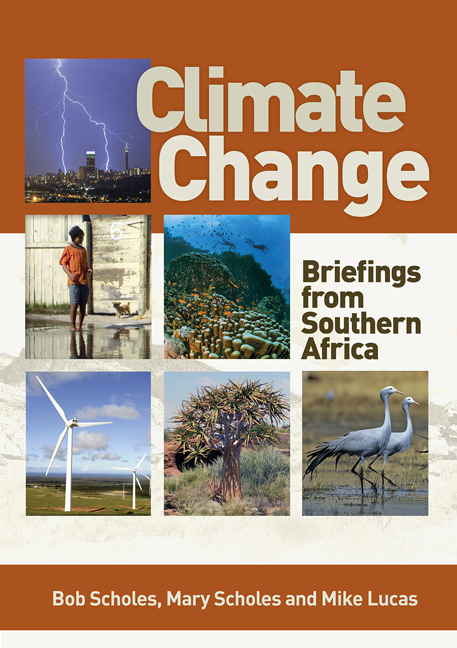Book contents
- Frontmatter
- Acknowledgements
- Contents
- Foreword
- Acronyms and abbreviations
- Preface
- How do governments assess climate change?
- Section 1 Earth system science: The processes that underlie climate change
- Section 2 Consequences of a changing climate for the Southern African environment
- Section 3 Consequences of a changing climate for society
- Introduction
- 1 Is the South African economy vulnerable to climate change?
- 2 How will climate change affect agriculture?
- 3 Will there be enough food to eat?
- 4 Do cow farts really cause global warming?
- 5 How will forestry in South Africa respond to climate change?
- 6 How will climate change affect South Africa's marine fisheries and aquaculture?
- 7 What are the human costs of climate change?
- 8 How do climate and air pollution interact to affect human health?
- 9 Will climate change cause malaria to spread in South Africa?
- 10 Should South Africans worry about rising sea levels?
- Section 4 What we can do to avoid and adapt to climate change
- Codicil Is there a dangerous level of climate change?
- Glossary
- List of figures
- References
- Reading list
- Index
Introduction
from Section 3 - Consequences of a changing climate for society
Published online by Cambridge University Press: 20 April 2018
- Frontmatter
- Acknowledgements
- Contents
- Foreword
- Acronyms and abbreviations
- Preface
- How do governments assess climate change?
- Section 1 Earth system science: The processes that underlie climate change
- Section 2 Consequences of a changing climate for the Southern African environment
- Section 3 Consequences of a changing climate for society
- Introduction
- 1 Is the South African economy vulnerable to climate change?
- 2 How will climate change affect agriculture?
- 3 Will there be enough food to eat?
- 4 Do cow farts really cause global warming?
- 5 How will forestry in South Africa respond to climate change?
- 6 How will climate change affect South Africa's marine fisheries and aquaculture?
- 7 What are the human costs of climate change?
- 8 How do climate and air pollution interact to affect human health?
- 9 Will climate change cause malaria to spread in South Africa?
- 10 Should South Africans worry about rising sea levels?
- Section 4 What we can do to avoid and adapt to climate change
- Codicil Is there a dangerous level of climate change?
- Glossary
- List of figures
- References
- Reading list
- Index
Summary
The remarkable and vibrant thing we call ‘society’ – that set of rules, relationships and institutions which allows us to generate not only basic necessities such as food, shelter and protection, but also the surplus which permits leisure, comfort and art for many – is comparatively recent in evolutionary terms. Complex societies, meaning those with many levels and with a high degree of differentiation of roles, arose after the Neolithic Revolution within the narrow climate niche provided by the remarkably stable, moist and equable period offered by the Holocene, which began about 10 000 years ago. Complex societies result in urbanization and a progressive disconnection for most people from direct exposure to nature. Most people these days get their food from supermarkets, which get it from distant farms, and their water from a tap plumbed from a dam on a faraway river. Nevertheless, even the most advanced society is founded on services delivered by ecosystems somewhere, including agricultural ecosystems. The capacity of ecosystems to deliver the services on which we depend is very sensitive to climate. So, although climate change is not ‘the end of life on Earth’, climate change beyond the limits of human or ecological adaptive capacity would be the end of advanced civilizations as we know them. Many past civilizations have tumbled as a result of climate change or environmental degradation, for example in Sumeria, Egypt, Central America and possibly even at Mapungubwe in Southern Africa. The difference now compared to then is that those extinct societies were regional, whereas in many respects ours is global.
Some of the obvious ways in which our society depends on the climate are for water supplies and food. The first half of the twenty-first century will be a critical period for both, especially in Southern Africa. Population projections suggest a levelling offof the global population after mid-century, at around ten billion people. We can have reasonable confidence in these projections because the fundamental controls on human demography are quite well known, and change rather slowly and predictably. Even now, human population growth is measurably slowing down for the first time in history, everywhere except in sub-Saharan Africa. At the same time, increasingly well-offpopulations in Asia and South America are catching up with Europe and North America in terms of per capita consumption of food, animal proteins, water and almost every other natural resource.
- Type
- Chapter
- Information
- Climate ChangeBriefings from Southern Africa, pp. 109Publisher: Wits University PressPrint publication year: 2015



